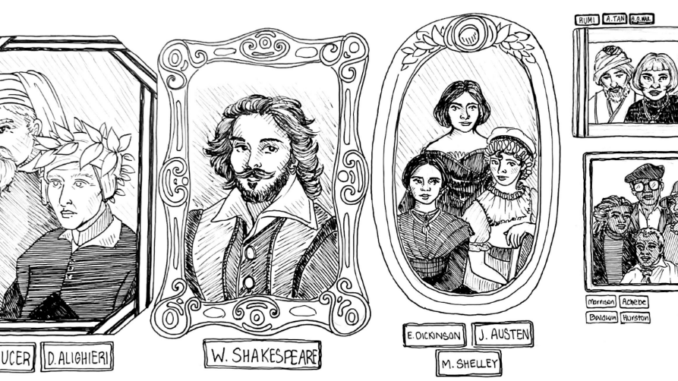
I decided to become an English major because the written word is a powerful tool for thought, and discussing it with others multiplies that power. When I made that choice, I had not yet thought about what an “English” major meant. I knew that there was a progression back in primary school from learning grammar and making hamburger paragraphs to reading novels, and I figured the name of the subject just stayed the same for consistency.
However, when I started taking English 206 at Lewis & Clark, I realized how deep the program’s ties to England still are. It is criminal that the study of ideas in narrative is focused through the lens of a country and a language. By making the English major a literature major, the power of stories without those sandbags would be unleashed.
Language is the primary reason world literature is not explored more in these courses — the major is named for a language after all. I understand that there are drawbacks to reading translated works, quality varies and something is often lost, but I would rather read the translations than ignore the perspectives of other languages.
When I read Gabriel García Marquez’s “Cien Años de Soledad” in English, I was fascinated and yet totally confused by the author’s choices. Since then, I have reread it and read another one of his novels and he has become one of my favorite authors. The reread provided minimal clarity, so I do not think my confusion comes from difficulty with translation. García Marquez said he liked the English translation better, but from the world of experience, that separates me from a Colombian writer who was friends with Fidel Castro.
One reason the English department avoids authors like García Marquez is that the World Languages departments teach authors in their respective original languages. But not all languages are taught at LC, meaning authors who write in other tongues are fair game. Second, readers should not have to master another language in order to glimpse the perspective of people who write in it, and for the sake of empathy, we need to read the works of the world.
Another part of the British focus is building a canon. The two English courses required for the major are 205 and 206. In the former, we start with Cædmon’s “Hymn” and “Beowulf,” the oldest English works we have: They have been around so long they are written in Olde English, which is indecipherable to a modern speaker. As the course progresses and bleeds into 206, more works become available and professors have more choices, but books still tend to come from England primarily and the United States secondarily.
I think there is value in the canon, as dialogue between writers is fascinating, but at this point in 205, most of the interactions between writers that we have explored include Italian or Greek thinkers and British writers’ thoughts on them. Of course, in those cases, language prevents the referenced works from being on syllabi, but should it?
The main issue I take with the current major construction is that the 200 level courses are required, and thus we do not have a choice in consuming the English canon. It is far too reminiscent of colonialism and reproductive of that mindset to ignore novels from the Global South in favor of English ones. I am currently taking African American Literature in one of my elective spots and it pains me that every English major is not required to read Zora Neale Hurston. How is Shakespeare’s perspective more relevant to students in America than hers?
I fell in love with literature and poetry because of their unique ability to share someone else’s thoughts and feelings, and I cannot stomach the required courses being so exclusionary.
Subscribe to the Mossy Log Newsletter
Stay up to date with the goings-on at Lewis & Clark! Get the top stories or your favorite section delivered to your inbox whenever we release a new issue.

Leave a Reply